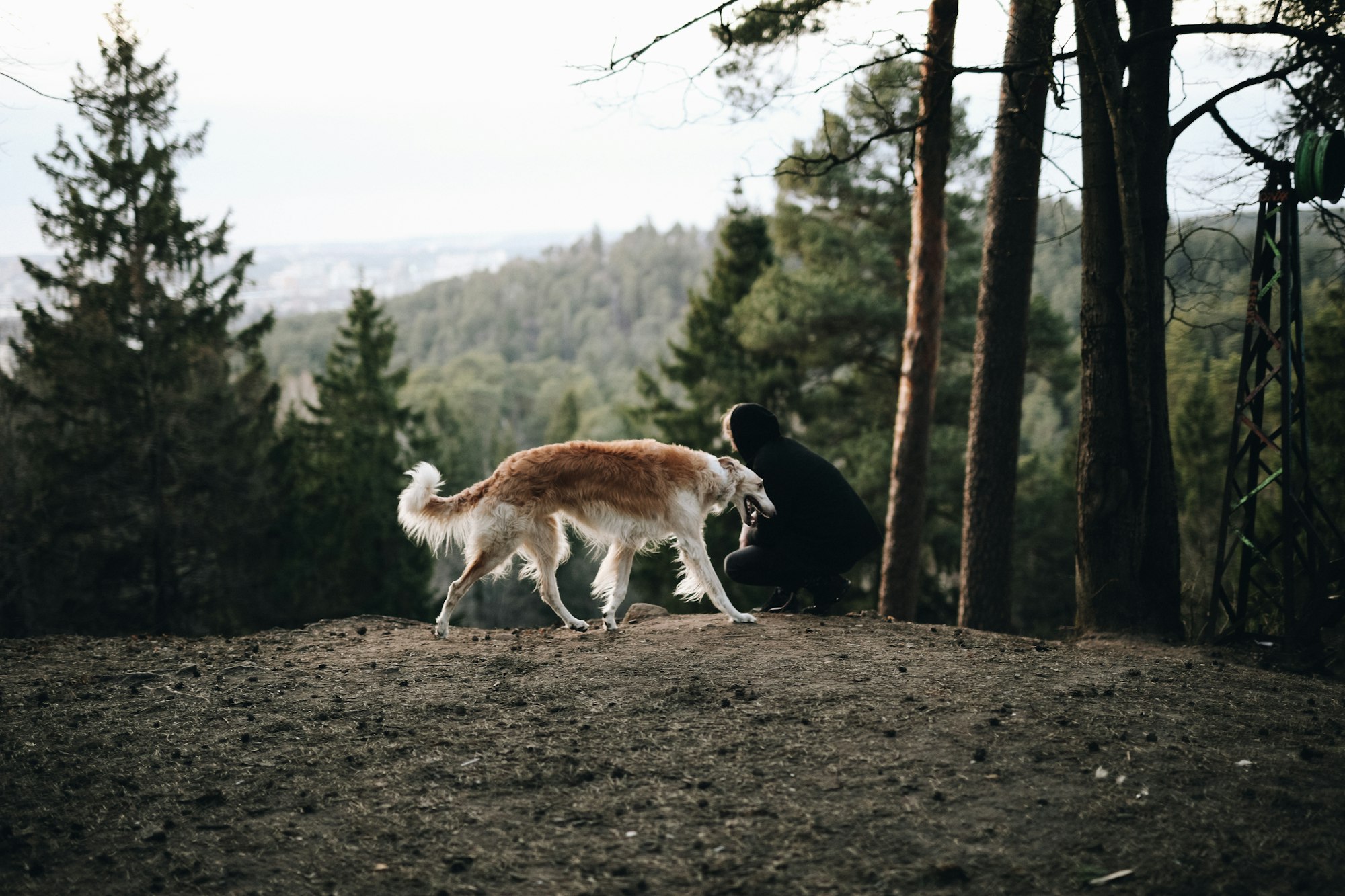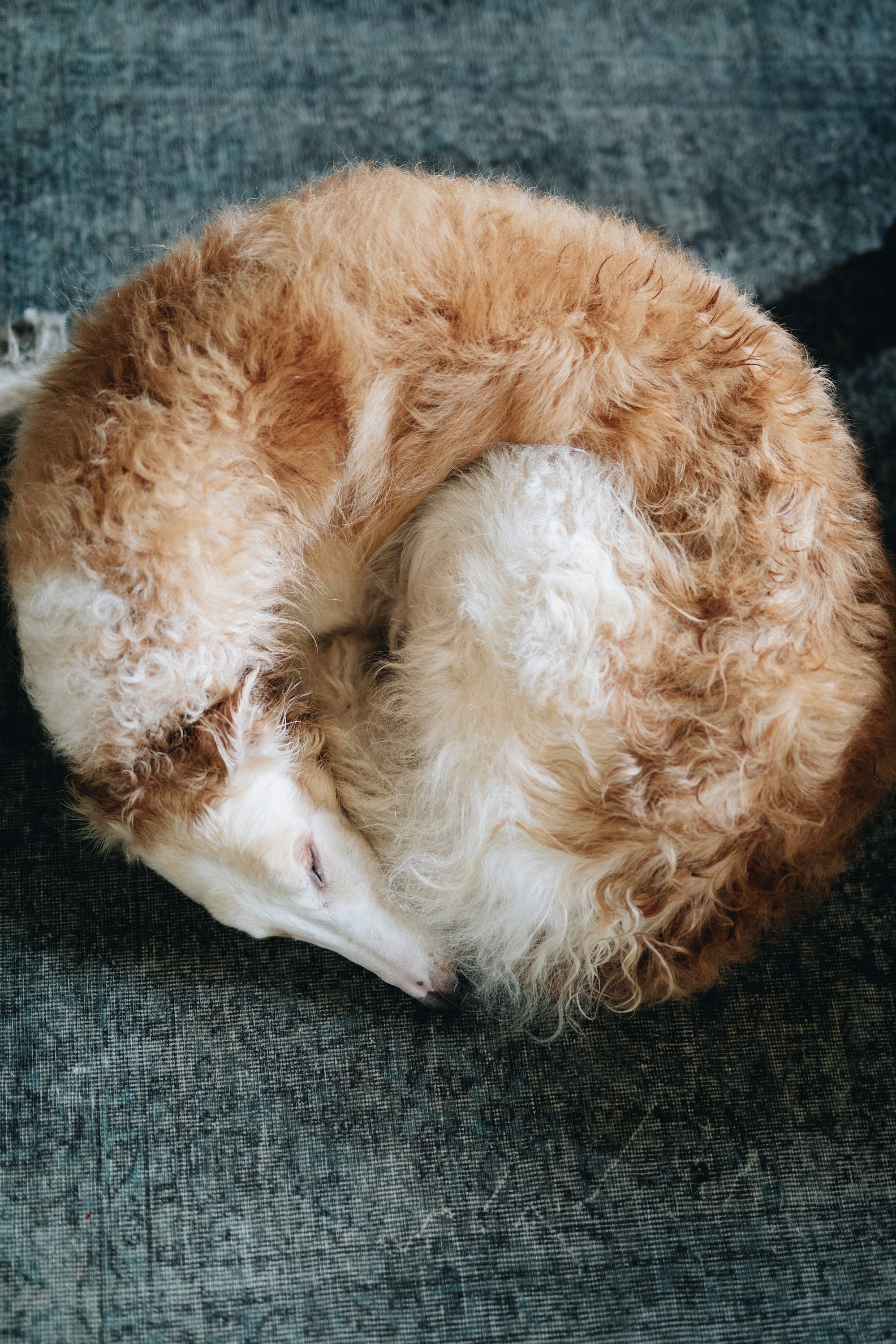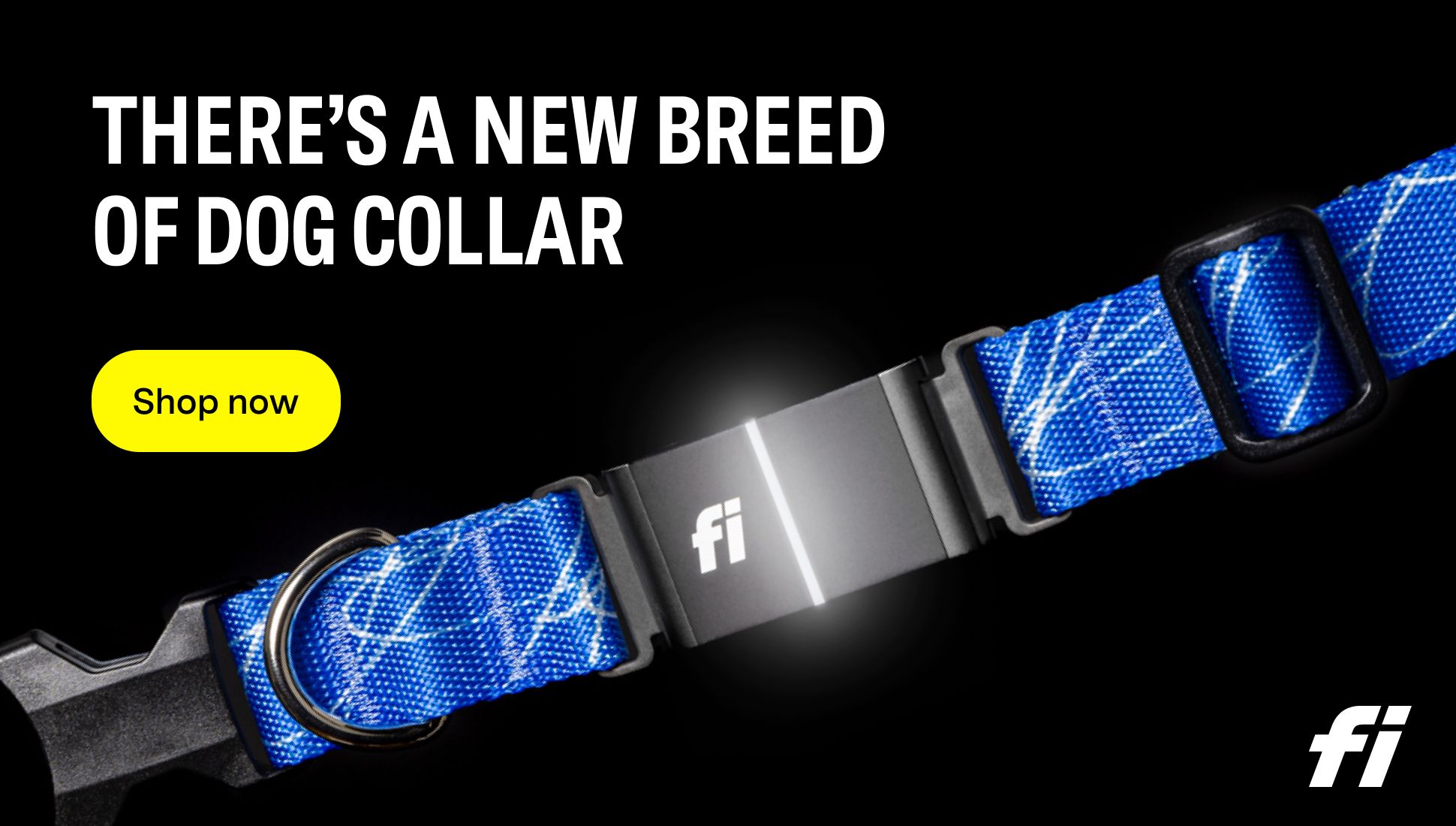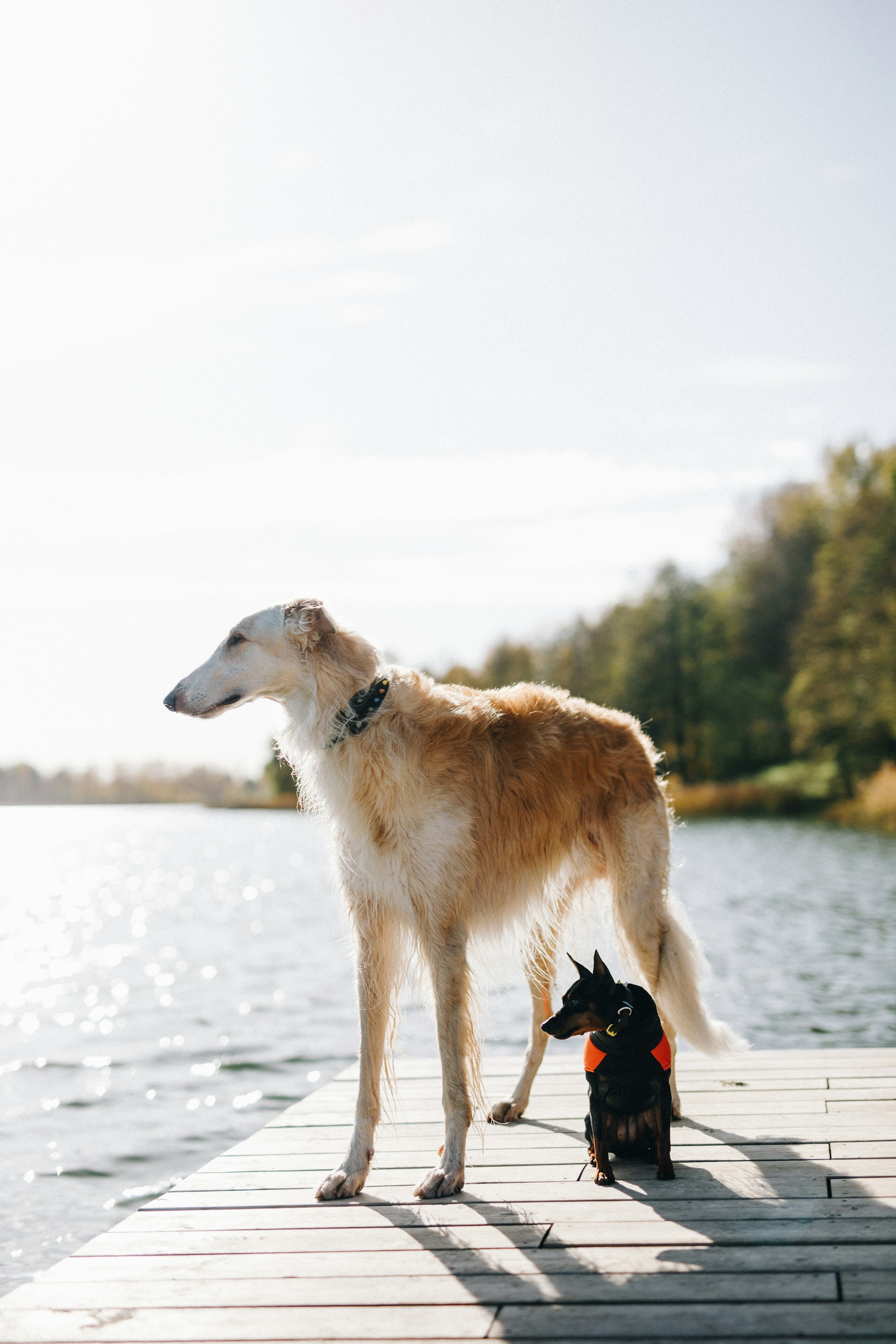The Borzoi, an elegant and graceful breed, evokes images of aristocratic Russian history and lush landscapes. But what lies behind those beautiful silky coats? This blog post will explore the fascinating world of the Borzoi, from its origins to its unique characteristics and care requirements. Join us as we dive into the captivating realm of these gentle giants, and discover how to best care for these affectionate family dogs.
Short Summary
- This article provides an overview of the Borzoi breed, including its history, physical attributes and special care requirements.
- Positive reinforcement training is essential for developing a well-rounded personality in Borzois while engaging activities provide mental stimulation and exercise.
- Adopting or purchasing a Borzoi requires considering costs, lifespan and locating a reputable breeder or rescue organization.

Understanding the Borzoi Breed
The Borzoi dog breed, also known as the Russian Wolfhound, is one of the many fascinating dog breeds that originated from Russia, where it was bred for hunting purposes. With their long, narrow heads and luxurious silky coats, they are renowned for their elegance and grace. These intelligent dogs make affectionate family pets, but their unique background requires special care and attention.
In this section, we will explore the history and physical attributes of this fascinating breed, focusing on those that share the same breed characteristics.

The History of Borzoi Dogs
The Borzoi breed was developed by Russian nobles who crossed Arabian greyhounds with native Russian breeds to create these elegant sighthounds. Bred for speed, strength, and tenacity, they were specifically designed to hunt wolves in packs, making them a favorite among the Russian aristocracy. Hunting expeditions were extravagant affairs, with more than a hundred Borzois accompanied by numerous foxhounds to seek and flush prey.
Tragically, many Borzois were slaughtered following the Russian Revolution in 1918 due to their association with the Russian aristocracy. However, the breed survived and made its way into the hearts of dog enthusiasts worldwide, gaining recognition by the American Kennel Club and the Borzoi Club of America.
Physical Attributes
Borzois are large, lean canines with distinct size variations between males and females. Males typically stand between 28 to 34 inches and weigh 75 to 105 pounds. Females are slightly smaller, measuring at 26 inches tall and weighing 60 to 85 pounds. Their beautiful, silky coats come in a variety of colors and textures, adding to the breed’s allure.
Despite their size, these elegant sighthounds are known for their gentle nature, making them ideal family dogs. However, their strong prey drive, a trait inherited from their hunting ancestry, means they may see small animals as potential prey, so early socialization is crucial to ensure they adapt well to a household with other pets.
Borzoi Temperament and Personality
Borzois are known for their calm and even-tempered disposition, but they can also be shy around strangers. Early socialization with other pets and people is essential to develop a well-rounded temperament, helping them adapt to various situations and settings.
In the following subsections, we will discuss the importance of socialization and interaction, as well as the breed’s prey drive and exercise needs.

Socialization and Interaction
Socializing your Borzoi with other pets and people from a young age is crucial for their development and adaptability. It helps them build confidence, understand how to interact with their environment, and adjust to different situations and settings. Proper socialization also enhances their physical and mental health, reducing fear and anxiety.
Introducing your Borzoi to other dogs and animals in the home during puppyhood is particularly important, as they may not always adapt well when entering a home with other pets.
Prey Drive and Exercise Needs
Borzois have a strong prey drive and require daily exercise to keep them healthy and happy. This includes:
- Walks
- Occasional running in a safely fenced area to satiate their desire to chase
- Participation in canine sports like lure coursing, which allows them to fulfill their natural hunting instincts in a controlled environment
Providing ample opportunities for physical activity not only benefits their health, but also helps strengthen the bond between you and your Borzoi.

Health Concerns and Prevention
While Borzois are generally healthy dogs, they may be prone to certain health issues, such as bloat, joint problems, and eye conditions. In this section, we will delve into these health concerns and discuss preventative measures that can be taken to ensure the well-being of your Borzoi.
Bloat is a condition in which the stomach becomes distended with gas or air.
Bloat and GDV
Bloat and Gastric Dilatation-Volvulus (GDV) are life-threatening conditions that Borzois are susceptible to. Bloat is caused by an excess of gas, food and fluid in the stomach. GDV, on the other hand, occurs when the stomach twists on itself, cutting off its own blood supply.
Owners should monitor their Borzoi for symptoms such as:
- Restlessness
- Abdominal discomfort
- Excessive salivation
- Swollen abdomen
Adjusting feeding schedules can help prevent these conditions. It is recommended to provide two smaller meals per day, rather than one large meal, and to avoid exercise for a couple of hours before and after mealtime.
Joint Issues
Borzois are prone to joint issues like hip dysplasia and elbow displaysia, conditions that result in the abnormal development of joints, causing pain and lameness. These joint problems are more common in large breed dogs and can significantly impact their quality of life. Regular check-ups with a veterinarian, maintaining a healthy weight, and providing the proper nutrition can help prevent or manage these joint issues.
Another joint concern for Borzois is Osteochondritis Dissecans (OCD), an inflammatory disease where cartilage in joints detaches from the underlying bone. OCD is most commonly found in the shoulder, but can also affect the elbow, hip, and knee joints. Treatment may include rest, weight management, and possible supplementation with glucosamine and chondroitin to support joint health.
Eye and Ear Care
Regular eye and ear care are essential for Borzois, as they may develop Progressive Retinal Atrophy (PRA) or be prone to ear infections. PRA is an inherited eye condition that can result in complete blindness. By closely monitoring your Borzoi’s eyes for signs of infection or abnormalities, you can help prevent vision problems.
Similarly, keeping their ears clean and inspecting them for signs of infection or wax buildup can prevent ear infections and discomfort.
Feeding and Nutrition Guidelines
Feeding a Borzoi requires a high-quality diet, proper meal planning, and careful scheduling to avoid health issues such as obesity and bloat. In this section, we will discuss aspects of choosing the right diet for your Borzoi, as well as meal planning and scheduling.
When selecting a diet for your Borzoi, it is important to consider the breed’s genetics.
Choosing the Right Diet
To ensure your adult dog Borzoi receives the necessary nutrition for optimal health, choose an age-appropriate, high-quality dog food approved by the Association of American Feed Control Officials (AAFCO).
It’s important to consult your veterinarian for guidance on selecting the most suitable diet for your Borzoi, based on their age, activity level, and health requirements.
Meal Planning and Scheduling
Planning and scheduling meals for your Borzoi is essential to prevent overfeeding and reduce the risk of bloat. It is recommended to provide adult Borzois with two small meals per day, ensuring they receive the necessary nutrients while maintaining a healthy weight.
Make sure to avoid feeding your Borzoi right before or after vigorous physical activity, as this may increase the risk of bloat.

Grooming and Maintenance
Regular grooming and maintenance are necessary for Borzois to maintain their luxurious silky coats and overall health. In this section, we will explore essential grooming practices, including coat care, nail trimming, and dental care.
Coat Care and Shedding
To manage shedding and keep your Borzoi’s coat clean and healthy, follow these steps:
- Brush their coat weekly with a pin brush.
- Remove any mats from behind the ears or between the hind legs.
- Avoid using a wire slicker brush.
- Borzois shed continuously throughout the year, with a period of heavy shedding once annually.
Occasional baths using non-drying shampoos containing aloe or oatmeal can help maintain their silky coat.
Nail Trimming and Dental Care
Trimming your Borzoi’s nails monthly is essential for maintaining their overall health and preventing overgrown nails that can cause discomfort. Additionally, regular dental care is crucial to prevent tooth decay and gum disease.
It is recommended to brush your Borzoi’s teeth at least two or three times a week, with daily brushing being even more beneficial.
Training and Enrichment Activities
Training a Borzoi requires:
- Patience
- Consistency
- Positive reinforcement
- Engaging activities to keep them mentally stimulated and physically active
Borzoi are sensitive and respond well to praise and rewards.
In this section, we will discuss positive reinforcement training techniques and engaging activities for Borzois.
Positive Reinforcement Training
Using positive reinforcement techniques is an effective way to train your Borzoi. Some examples of positive reinforcement include:
- Treats
- Toys
- Verbal praise
- Physical affection
These gentle, affectionate family dogs respond well to praise and rewards, making their training experience positive and enjoyable.
Consistency is key to successful positive reinforcement training, ensuring that desired behaviors are rewarded and reinforced.
Engaging Activities
To keep your Borzoi mentally and physically stimulated, engage them in dog sports such as:
- Agility
- Lure coursing
- Scent work
- Fetch
These activities not only provide essential exercise, but also challenge their natural hunting instincts in a controlled environment.
Other enjoyable activities for Borzois include long walks and running in safely fenced areas, allowing them to expend their energy and maintain their overall health.
Adopting or Purchasing a Borzoi
When considering adopting or purchasing a Borzoi, it’s important to take into account the costs, lifespan, and the process of finding a reputable breeder or rescue organization.
In the following subsections, we will discuss the costs and lifespan of Borzois and explore how to find a responsible breeder or rescue group.
Cost and Lifespan
Borzoi puppies can cost between $1,500-$5,000, depending on the breeder and other factors. The lifespan of a Borzoi typically ranges from 9-14 years, making them a long-term commitment for potential owners.
It’s essential to be prepared for both the financial and time investment required when adopting or purchasing a Borzoi.
Finding a Reputable Breeder or Rescue
Researching breeders and rescue organizations is essential to ensure you are adopting or purchasing a healthy Borzoi puppy. The Borzoi Club of America is a great resource for finding reputable breeders and rescue organizations. When choosing a breeder, make sure they provide health clearances for the parents of the puppy, demonstrating that they have been tested for and cleared of specific health conditions.
Adopting from a rescue organization gives a second chance to a Borzoi in need and supports the mission of rescuing and rehoming dogs. Whether you choose to adopt or purchase, being informed about the breed’s genetic health problems and ensuring the health and well-being of your new Borzoi is of utmost importance.

Summary
In conclusion, the Borzoi is a fascinating and elegant breed with a rich history and unique characteristics. Caring for a Borzoi requires attention to their specific needs, such as proper grooming, nutrition, training, and health care. By understanding their temperament, exercise requirements, and potential health concerns, you can provide the best possible care for your Borzoi and enjoy a rewarding, lifelong companionship with these gentle giants.
Frequently Asked Questions
Why are Borzois so rare?
Due to their association with the aristocracy in Russia, Borzois were mass-killed during the Russian revolution and have since been difficult to find outside of Russia.
As a result, Borzois are now rare.
Why are Borzois suddenly so popular?
The Borzoi has become increasingly popular due to its popularity on the internet, with TikTok users editing images to make its snout appear even longer. This trend has made the breed a desirable pet for many dog lovers in recent times.
Is Borzoi a good family dog?
Borzoi are an ideal family dog, as they are friendly towards strangers but can serve as an adequate watchdog by barking.
However, they are not very good at protecting their owners.
Why do Borzois not live long?
Unfortunately, Borzois typically do not live long, with an average life span of 9-14 years due to their tendency to suffer from a variety of health problems.
These health problems can include heart disease, hip dysplasia, and eye problems. It is important to be aware of these issues and to take steps to ensure that your Borzoi is living a healthy life.
Regular vet visits, proper vet care.
How much do borzois cost?
The price of a Borzoi puppy from a breeder usually ranges between $1800 and $2000, with males typically being more expensive than females.






